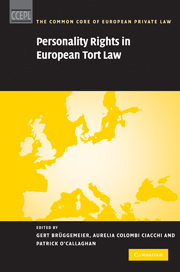Editorial note
Published online by Cambridge University Press: 06 July 2010
Summary
Most of the following country reports were completed in 2007 but for reasons of the work schedule we were unable to make major updates to the reports before publication. Naturally, there have been developments since 2007, some of a relatively minor nature and some which are clearly quite significant. In England, while Campbell v. MGN remains the leading authority for the fledgling informational privacy tort, there have been some decisions of the lower courts, which should be mentioned here, namely McKennitt v. Ash, Murray v. Express Newspapers plc and Mosley v. News Group Newspapers Ltd. In Germany, as set out in Case 7, courts and scholars traditionally regarded pictures of public figures as pictures of contemporary history. But the German reporters inform us that the legal landscape has changed following the decision of the European Court of Human Rights in von Hannover. Courts in Germany now allow publication of pictures of public figures only when they are deemed newsworthy. The newsworthiness may be due to the fact that the person is depicted in an official function or if there is a story to the photo which is of public interest. The public interest may also follow from a text added to the photo.
- Type
- Chapter
- Information
- Personality Rights in European Tort Law , pp. xviii - xxPublisher: Cambridge University PressPrint publication year: 2010
- 1
- Cited by



